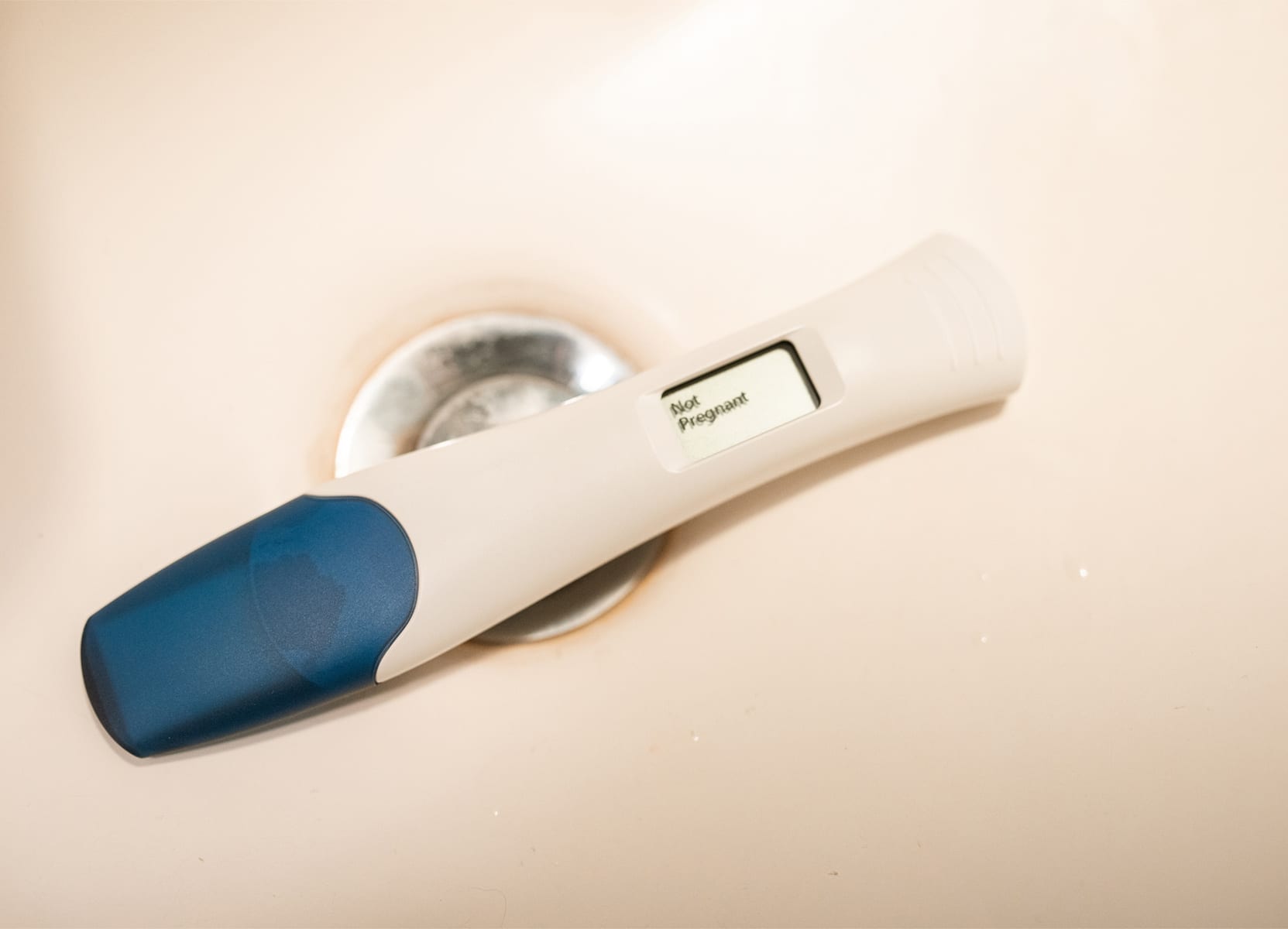You know you’re not pregnant – so what’s with the missed period?
It’s the 16th of the month—or whenever you expected to start your period—and still… not a drop of blood in sight.
We all know that pit-of-your-stomach feeling. Is it time to run to the nearest pharmacy for a home pregnancy test? Perhaps. But maybe not.
If you’re definitely not having sex and your period is late or absent, don’t sweat it: You’re not pregnant with a ghost! There are a variety of reasons for a late period that have nothing to do with semen. From hormonal imbalances to simply not sleeping enough, here are 10 common causes for a late or irregular period.
What counts as a late period?
Despite what you may have thought, a one- or two-day delay in menstruation doesn’t actually count as a late period.
Your period is officially late when it’s been more than 35 days since the start of your last menstrual cycle. Most menstruators have their periods about every 28 days. Most menstruators have their periods about every 28 days. When it’s been more than 35 days since you’ve noticed any menstrual blood in your underwear, it could be a signal that something abnormal is happening within your body – and that you may want to start paying closer attention to any other physical changes.1

Why is my period late? 10 most common reasons for a late period
1. Hormonal imbalances
One of the most common reproductive health conditions that can cause late or irregular periods is Polycystic Ovary Syndrome (PCOS), a hormonal disorder. Individuals with PCOS often have higher androgen (i.e. testosterone) levels which disrupt ovulation and may lead to other symptoms like irregular periods, hair on the face, chin, or breasts, and hormonal acne.
While there is no cure for PCOS, there are treatments available (as well as lifestyle changes) that can help get a more regular menstrual cycle and rebalance your hormone levels.2 Talk to your healthcare provider to learn more.
2. Over-exercising
Are you a crossfit addict or endurance runner? Playing a sport professionally? Working out multiple times per day? While there’s absolutely nothing wrong with a super active lifestyle, some menstruators who work out a lot may stop ovulating – which leads to irregular periods or, in some cases, a completely absent period.
AmenorrheaThe absence of menstruation, often defined as missing one or more menstrual periods. , or the halting of menstrual cycles, is particularly common in female athletes like gymnasts or endurance runners due to the extreme physical conditioning of their sport.3 Basically, due to excessive exercise, your body goes into “conserve resources mode” and begins to shut down some of your reproductive functioning to compensate for all that energy expenditure.

Contrary to popular belief, it’s actually not normal to miss your period during times of intense athletic training. If this happens to you, speak with your healthcare provider as low estrogen can cause bone loss and faster aging of your heart and blood vessels. They may refer you to a dietician or nutritionist to make sure you’re getting enough calories and macronutrients to match how much you’re working out.4
3. Stress
You know that old saying about the connection between mind and body? It turns out that running yourself ragged is a very legitimate cause for an irregular menstrual cycle and/or missing period. Sort of like the physical stress created by over-exercising, severe emotional stress can also trigger your body to direct energy away from “unnecessary” bodily systems, i.e. your reproductive system. This, in turn, halts ovulation and messes with your normal cycle, which results in menstrual irregularities.
If you’ve been going through an especially stressful or emotional few weeks (or months or, hey, even a year or more, A.K.A. chronic stress) and you notice your period has gone astray, take that as a sign to slow down for a bit. Of course, you should also talk to a health professional to rule out any other possible reasons.

If it turns out it really is just stress, your provider can refer you to a licensed mental health counselor or therapist. If out-of-pocket fees are a barrier, ask about lower-cost resources like online, community-based, or group therapy. Tackling emotional trauma will help your body re-regulate and get those stress hormones (like cortisol) back under control.5
4. Birth control
Another common culprit behind a late or missing period? Hormonal contraception methods. Birth control pills, IUDs, the patch, and the ring may cause some folks to skip periods, particularly when you’ve just started that particular method of BC and your body is settling into its new rhythm. Certain types of hormonal birth control may put a halt to your period altogether (this is especially true of the Mirena or Skyla IUD).6
Talk to your healthcare provider or ObGyn if you’re concerned about a missing period and you’re on hormonal BC. In the meantime, check out our recent article about birth control bleeding (called breakthrough bleeding) and how it’s different from your “typical” menstrual period.

5. Weight-related factors
Changes in your body weight – whether you are losing weight or you experience weight gain that leads to obesity – can sometimes lead to hormonal changes or imbalances that have an impact on your menstrual cycle. Sudden weight loss or low body weight are a common culprit behind missing or late periods, but being overweight may also contribute to cycle irregularities (and is linked with PCOS). Sudden changes in weight can sometimes happen as a result of medical conditions or eating disorders such as bulimia or anorexia.6 Sudden changes in weight can sometimes happen as a result of medical conditions or eating disorders.
6. Breastfeeding
One of the many benefits of breastfeeding is that you most likely won’t have a period while you are nursing! Once your period does return postpartum, it may be super irregular and light (think spotting) until you are fully done breastfeeding. Enjoy the break while it lasts—you’ve earned it!7
7. Pelvic Inflammatory Disease (PID)
Pelvic Inflammatory Disease (PID) is an infection of the female reproductive organs sometimes caused by a sexually transmitted infection. Symptoms include abnormal vaginal odor or discharge, pain, and/or tenderness in the lower belly – along with irregular periods.
The great news is that PID is generally treatable with antibiotics. The sooner you start treatment, the more likely it will be successful. However, keep in mind that PID can affect female fertility if left unresolved (plus, it’s just plain uncomfortable) so definitely don’t wait before seeing a healthcare provider if you’re noticing any of the symptoms mentioned above. 8
8. Menopause or perimenopause
If you’re definitely not pregnant and you’re in your late thirties to forties, a missing or late period could be a sign that your body is entering perimenopause: the phase leading up to menopause (the cessation of menstruation).
During perimenopause, your ovaries start to produce less estrogen – and this can impact your menstrual cycle. This is also true for individuals who undergo surgical procedures to remove the ovaries or uterus. If you are younger than age 40, see your ObGyn or PCP as early menopause can lead to bone loss and heart problems.9
9. Sleep
It could be that those sleepless nights are hijacking your menstrual cycle. Disruption of the normal circadian rhythm has been found to cause changes in menstruation cycle length – and a longer-than-usual cycle = a late period.10 All the more motivation to unplug and practice good sleep hygiene (i.e. maybe try to cut back on that late-night doomscrolling).
10. Thyroid problems
Take two fingers and press down on the side of your neck – right below your Adam’s apple. Underneath that skin is a butterfly-shaped gland called the thyroid, which is kind of like the Chief Hormonal Officer of the human body. Too much or too little production of thyroid hormone (hyper or hypothyroidism) can cause all sorts of weirdness in your body, including late or even absent periods.11
If thyroid issues run in your family and you’ve noticed changes to your menstrual cycle, mention it to your healthcare provider. They may order some blood tests to measure your thyroid hormone levels and test your overall thyroid function.

Is it normal to miss a period?
It is not uncommon to occasionally miss a period. Factors such as stress, changes in weight, hormonal imbalances, and certain medical conditions can cause irregularities in the menstrual cycle. However, if you consistently miss periods or have concerns, it’s best to consult with a healthcare professional.
When to talk to your doctor about a late or missing period
Most people who menstruate don’t have a perfectly regular cycle. A couple of days off here or there generally isn’t cause for concern (i.e. going from a 28-day cycle to a 31-day cycle to a 27-day cycle is NBD). However, you should speak with your doctor if you’ve ruled out pregnancy and:
- You haven’t had a period in over three months
- Your periods are suddenly irregular
- You notice there are more than 35 days between your periods
- Your period lasts for more than seven days
- You bleed between periods
- Your periods are extremely heavy
- Your periods are extremely painful
Any of the above could indicate a more serious underlying condition, and, regardless, you should always bring up worrying menstrual cycle changes to your healthcare provider or ObGyn.12
Key takeaways
A lot of the time, a period that’s late by a day or two is nothing to worry about. But if you’re 100% sure you aren’t pregnant and your period is suspiciously missing for more than a few days, it’s a good idea to bring it up with a qualified healthcare professional.
In some cases, a late period or irregular cycle is due to more than one factor – or it may be seemingly random. Regardless, take it as a sign to check in with yourself and pay extra-close attention to what your body is telling you at that time. You might just need a weekend off to catch up on sleep, step away from the computer screen, and eat a nourishing meal.
Remember: Your period is a vital sign! Don’t be scared to advocate for yourself if you notice something out of the norm going on with your menstrual cycle. After all, no one (not even the most qualified doctors in the world) knows your body better than you do.
This article is informational only and is not offered as medical advice, nor does it substitute for a consultation with your physician. If you have any gynecological/medical concerns or conditions, please consult your physician.
© 2023 The Flex Company. All Rights Reserved.






